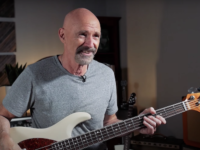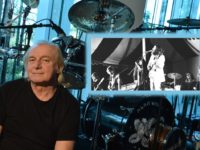We caught up with drummer Alan White as Yes prepared to reconvene for the next leg of a lengthy tour in support of its comeback album Fly From Here, beginning on Thursday. Besides playing and touring behind the legendary progressive rock band’s first new album in a decade, White is also featured on a terrific new trio recording called Levin Torn White, featuring guitarist David Torn and bassist Tony Levin.
White joined us for the latest Something Else! Sitdown to talk about his long history with Yes, a band he’s drummed for since 1972; that intriguing new trio project with Levin and Torn; and his memorable stint between 1969-71 with John Lennon’s Plastic Ono Band — a musical relationship that began when the Beatles were still together …
NICK DeRISO: Yes reformed for its first new studio project since 2001’s Magnification, but with new singer Benoît David in place of Jon Anderson. How was that transition?
ALAN WHITE: Geoff Downes came back in, and he wrote some of the original material that we took the main track from (on Fly From Here). With Geoff, I think we sound more like the 1980s sound of Yes — like the Drama period, where we had “Machine Messiah” and those kind of tracks. It kind of had the feel of moving back to that era — yet still being something fresh and new. Everybody is getting on fine. It took a couple of years to break Benoit in — to get everything like it should be. When you get a singer that also sounds like your original singer, it’s not quite the same. But he sounds he could be him, if you close your eyes. This will be the fifth tour this year. We’ve been really working pretty hard. It’s come together, but so far on tour we’ve only played the main track. Starting next year, we’ll perform the whole album. We’ll get through this one and then see what the plans are after that.
[GIMME FIVE: In Part 2 of this interview, Alan White offers insights into Yes’s ‘Fly From Here,’ John Lennon’s ‘Imagine,’ George Harrison’s ‘All Things Must Pass’ and ‘Levin Torn White.’]
NICK DeRISO: Your entrance into the band was, to say the least, last minute. After original drummer Bill Bruford’s departure for King Crimson, you had — what? — three days to learn all of Yes’ material for the looming tour in support of 1972’s Close to the Edge, right?
ALAN WHITE: It was really a nightmare. You can’t just step off the sidewalk and play Close to the Edge. And, remember, they hadn’t even played it on stage yet. I really only had one short rehearsal. I would listen to their music all day and all night — and came up with my version of what Bill Bruford was doing. The band was as scared as I was on stage, but I got pretty much everything right. The guys said: ‘I can’t believe you did it!’ The second night, I made a few more mistakes but, by about the fifth gig, I was right in the pocket. It was stressful, to say the least.
NICK DeRISO: In the midst of this resurgence with Yes, you also issued a difficult-to-categorize, free-form collaboration with guitarist David Torn and bassist Tony Levin this year. There’s such an interesting distortion-based dissonance to the project. How did you fit your musical voice into that?
ALAN WHITE: I came up with some really different drum patterns and timings. Some of it was especially for this, but some of them were things I have been working on for years. Tony and Torn, being world-class players, they then came up with their own ideas, and that’s how it went. Toward the end, it was more Tony and Torn who collaborated, since I was on tour with Yes. I was on the telephone quite a bit, talking to them. Some of those things were inspired from me as the source. It might change direction slightly, become something different. Now that it’s out, I can’t think of a name to explain it. That’s the thing I always hate with the music business: They say: ‘What kind of music is it?’ I’ve always hated labels for things. They tried to label Yes music, and basically it’s a combination of many different kinds of music. It’s its own thing — fusion, jazz, orchestral stuff, R&B, rock. It pretty much fused everything from all of these parts. I have always been very wary about the labeling thing.
[SOMETHING ELSE! INTERVIEW: Billy Sherwood discusses his decade-long tenure with the legendary prog-rock band Yes, and how it all fell apart.]
NICK DeRISO: The Levin Torn White project seems to take those progressive leanings to their natural end point, nudging all the way over toward complete improvisation. Is that something that could be recreated in a live setting?
ALAN WHITE: What we did creates a slight bit of mystery about it. We’ve talked on email about doing some shows, maybe next year sometime. I think everybody still has that in the back of their minds. But I told Tony we would have to rehearse at least a month to recreate that stuff!
NICK DeRISO: When I think of instant collaborations like that, I always come back to the very first solo appearance for John Lennon, with the Plastic Ono Band in 1969. Is it true that you rehearsed on the plane en route to Toronto?
ALAN WHITE I was cooking breakfast, living with bunch of musicians in a house in west London. I got a call from Apple studios, where I knew a few people. But I didn’t expect it be John Lennon. I thought it was a friend of mine, joking around. I said: ‘I’ve got to get back to breakfast; call me back later.’ And I put the phone down. It rang again about 10 minutes later. He said: ‘No this is John Lennon.’ That’s when I forgot about breakfast. I left everything on the stove! He’d seen me play, and John said ‘we’ve got this gig.’ I went to Heathrow and walked into the VIP lounge — and there was John and Yoko and Klaus Voorman (who played bass on the date). I was feeling very young and naïve, to be in the company of those people. Then Eric Clapton walked through! John said: ‘I forgot to tell you, Clapton’s playing guitar.’ That was another shock right there. Naturally, it was a huge step up in my career. I was taking it all in my stride, but only because I was so young. I didn’t realize how much it really meant until many years later. I thought: ‘Jesus, did I do that? I was only 20 years old!’
[GIMME FIVE: Yes cofounder Jon Anderson talks with us about returning to a favorite from ‘90125,’ rocking out with Vangelis and Tolstoy – and, yeah, how mountains really did once come out of the sky.]
NICK DeRISO: In addition to the lengthy Yes engagements, and the work with Levin and Torn, you’ve kept a local band going for years, simply called White. Do you ever rest?
ALAN WHITE: The band is good. While I had a month off, or so, we got into writing some new stuff. We’re working on a lot of new material right now. It’s refreshing. You feel like you are getting a bunch of music out there. Of course, Yes is everybody’s main project. Even with all the other things we do, Yes is the first thing we concentrate on. I’ll be working with Yes all the way through Christmas, including six weeks in Europe. We’re in Portugal and Spain, then we finish in Moscow on Dec. 15. It’s brutal there in the winter. I’m going to have to pack lots of clothes!
- How Deep Cuts on ‘Music From Big Pink’ Underscore the Band’s Triumph - July 31, 2023
- How ‘Islands’ Signaled the Sad End of the Band’s Five-Man Edition - March 15, 2022
- The Band’s ‘Christmas Must Be Tonight’ Remains an Unjustly Overlooked Holiday Classic - December 25, 2016




